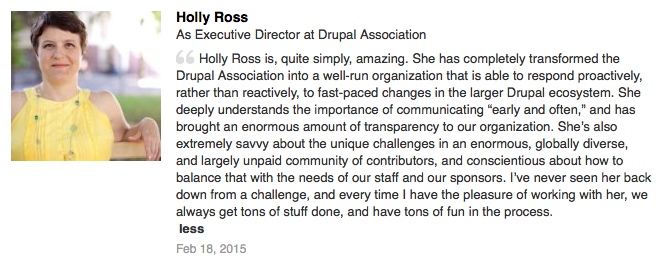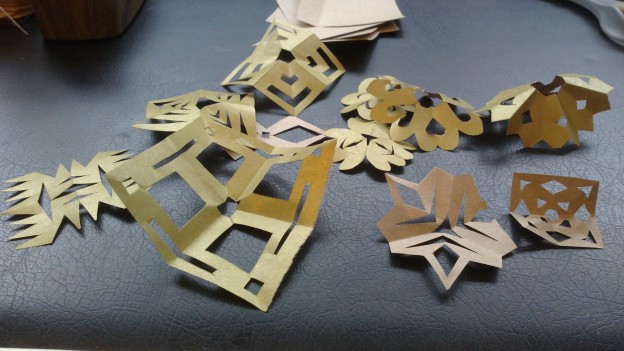An internationally known community manager, speaker and author, Leslie Hawthorn has spent the past decade creating, cultivating and enabling open source communities. She created the world’s first initiative to involve pre-university students in open source software development, launched Google’s #2 Developer Blog, received an O’Reilly Open Source Award in 2010 and gave a few great talks on many things open source. In August 2013, she joined Elasticsearch as Director of Developer Relations, where she leads community relations efforts.
I’ve known Leslie for years now, and she is forever inspiring me with her ability not only to find visionary ways to improve the world, but also to follow-through with the rabble-rousing, cat herding, paperwork, and everything else that’s needed to take ideas from “wouldn’t it be nice if?” to “this is how we’re going to do it.” I really enjoyed her recent blog post, A Place to Hang Your Hat, and asked Leslie if she had a bit of time for an interview to tell Geek Feminism blog readers a bit more about the idea.
For people who haven’t read your blog post yet, can you give us the point of “let’s all build a hat rack” in a few sentences?
In open source software projects – and life in general – there are any number of contributions that are underappreciated or go unacknowledged. I’m very aware of how often that underappreciation or lack of acknowledgement is due to socialization around what labor is considered valuable vs. what is largely invisible – we are taught to value and celebrate the accomplishments of white men and minimize the impact of the labor of women, people of color, transpeople, differently abled people, etc.
The let’s all build a hat rack project is a call to acknowledge all the diverse contributors and contributions in our work lives and volunteer projects, with a special emphasis on acknowledging folks who are not like you first. You can do this easily by writing them a recommendation on LinkedIn – which they can decide to approve for inclusion on their profile – or just sending them a thank you note they can use later. Bonus points for sharing your appreciation on social media using hashtag #LABHR.

Today, in the further adventures of #LABHR, a LinkedIn recommendation for the indefatigable @drupalhross! pic.twitter.com/b2ynru6uAa
— webchick (@webchick) February 18, 2015
What inspired the project?
It came about for a few reasons, but first and foremost I want to acknowledge Deb Nicholson for inspiring the phrase “let’s all build a hat rack.” There’s more about Deb’s contributions to my thinking and the open source community in the post, so please check it out.
Beyond that, the project came about largely due to the intersection of two frustrations: the lack of understanding people have for everything I – and friends like Deb – have accomplished, and the seemingly unending cycle of horrible news in the tech industry. While it’s important to have a clear and candid dialog about sexism, racism, ableism, transphobia and other issues impacting the diversity of the technical community, that seems to be all I am reading lately. The news is usually sensationalistic and often depressing.
I wanted to give myself and everyone I know something uplifting and useful to read, to encourage all of us to show gratitude and appreciation, and to make that show of gratitude a useful way for contributors who are usually not acknowledged to get the credit they deserve. Not just because they deserve it, but because that public acknowledgement of their work helps with acquiring jobs, landing their next big project and feeling good about continued contributions.
What tips do you have for people struggling to find someone to recommend?
You know, I figured this project would be really easy until I started writing up recommendations. To my earlier point about being socialized to see some labor as invisible or less valuable, I had no trouble thinking up white dudes who had done things I appreciate. I had to push myself harder to think about the women in my life who have made significant contributions, even though they are numerous. I can imagine that some humans, specifically male humans, are having the same issues.
So, to get started, think about things /actions / projects that have meant a great deal to you. Was there a conference you attended where you had an “ah ha” moment? Were you able to solve a problem thanks to great support on a project’s web forum or in their IRC channel? Did you read a blog post that was filled with brilliance and inspired you to be better at your craft? Cool. Were there people involved who were not like you? Great! Not sure exactly what they did? I’d call that an excellent opportunity to find out more about their involvement, thank them for educating you and their contribution, and then use that information to write a recommendation.
I’m not going to lie to anyone – you’re may have to think hard about this at first and it will be uncomfortable. You have to internalize the fact that you’ve been taught to see some very amazing work as non-existent or, at best, mere window dressing. That’s OK, too. The first step toward progress is thinking through that discomfort, then finding the humans to thank at the end of it.
If you’re still having trouble thinking of someone, that’s OK. Talk to your friends or fellow project members for suggestions. Tell them you’re thinking about participating in the #LABHR project, but need help getting started. Friends can help you think of people you’ve missed celebrating, and they may also want to join the experiment and recommend people, too!
I’ve always been impressed with your gracious ways of thanking and recommending people, so I feel like you must have some insight into writing good recommendations. Are there any suggestions you have for people who want to write a great ones?
Keep it short and simple. One of the things that makes writing recommendations hard is that we’re trying to encapsulate so many good qualities into a few short sentences. You don’t have to write down everything wonderful about the person you’re recommending, just the 3-5 ways they’ve been most impactful in your project / company / life. In a pinch, concentrate on things employers want to hear about, as that will make your recommendation most useful.
What impact do you hope to have on people’s lives with LABHR?
I’d like this experiment to give the technical community a reason to express more gratitude for all contributions. I especially want to give white male allies a clear, actionable path to improving things for underrepresented groups. Writing a recommendation will take you about 15 minutes, but it can have immeasurable impact on someone’s future career prospects.
I’m really excited to say that I’ve seen 15 permanent recommendations go by and a whole lot of shout-outs under the #LABHR hashtag so far. I hope many more recommendations will come.
Want to see more inspirational LABHR entries? Check out the #LABHR hashtag on twitter and then write your own!






